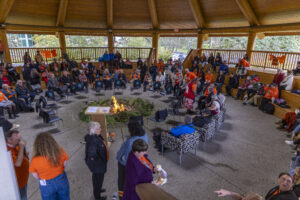On Monday, September 29, Camosun College will host its annual Orange Shirt Day ceremonies at the Lansdowne campus.
Morning workshops will run from 9:00 am to 12:00 pm at Na’tsa’maht and the Sherri Bell Hall in Wilna Thomas, and the ceremony takes place at 1:30 pm at Na’tsa’maht.
Last year, the English department spearheaded the organization of the event, the first the college has taken on the role from previous organizers in the Centre for Indigenous Education and Community Connections (IECC). This year, the Community, Family and Child Studies department is organizing the event. Camosun IECC administrative support Christine La Vallee says that “we’re very proud” of Camosun to be moving forward with planning the annual event.

“One of the calls to action that was taken on by the college was to not have the Indigenous department be the ones to bring awareness, because we as individuals are so deeply affected by this day and our own lived experiences in history, so as Indigenous people we are all very sensitive to the day,” she says. “It, in the past, has been challenging to be the educators about this day, given the so very personal history that is around not only Indigenous individuals but communities and events, such as the reveals of finding the remains of our loved ones who turned out to be missing in the era of residential schools.”
La Vallee says that the result of this is that attendees will learn about Orange Shirt Day from “perhaps a less Indigenous view but perhaps the same important historic values of what happened.”
“Orange Shirt Day doesn’t need to be a conversation held just within Indigenous communities,” says La Vallee. “Certainly the caregivers of those residential schools were certainly not Indigenous. Not that it is the non-Indigenous colleague’s role to field that information, but it is a milestone for non-Indigenous communities to be discussing Orange Shirt Day outside of the experience of Indigenous peoples.”
La Vallee says that it’s important to attend events like this to bring awareness to the harms of the past in an attempt to ensure they don’t happen again.
“Indigenous students know why it’s important to attend,” she says. “Those values would have to be found within the students themselves, but of course we encourage that the attitudes that prevailed through the residential school era no longer exist… So while I think Indigenous students are determined to not have anything like this happen again—that’s a resolve that we as Indigenous people all have: this will never happen again—I think for the non-Indigenous student, the awareness of harmful attitudes and perhaps historic harmful attitudes never get repeated.”
La Vallee says that people should be gentle and respectful when talking about these subjects with Indigenous communities and members, specifically with Indigenous elders, as the subject of residential schools isn’t something that everyone is emotionally capable of discussing.
“The Indigenous elder that’s sitting on the bus, you know, if you’re curious, there’s a whole big internet, and the topic is so personal that not everyone is equipped to talk about it, not everyone is emotionally capable of having words to the depths of this experience. It’s an event to explore internally, within the person, Indigenous or non-Indigenous. I would just encourage tact when hoping to get into conversations about Orange Shirt Day, make sure there’s an openness and a consent. If it’s in depth, I would hope that the person being talked to about Orange Shirt Day, if Indigenous, would have some emotional care and emotional support around. You can’t just open up traumas and then, ‘Okay, I’m done,’ and leave that elder to put themselves back together… It’s a depth that has to be respected and cared about, in conversation and in deed.”

